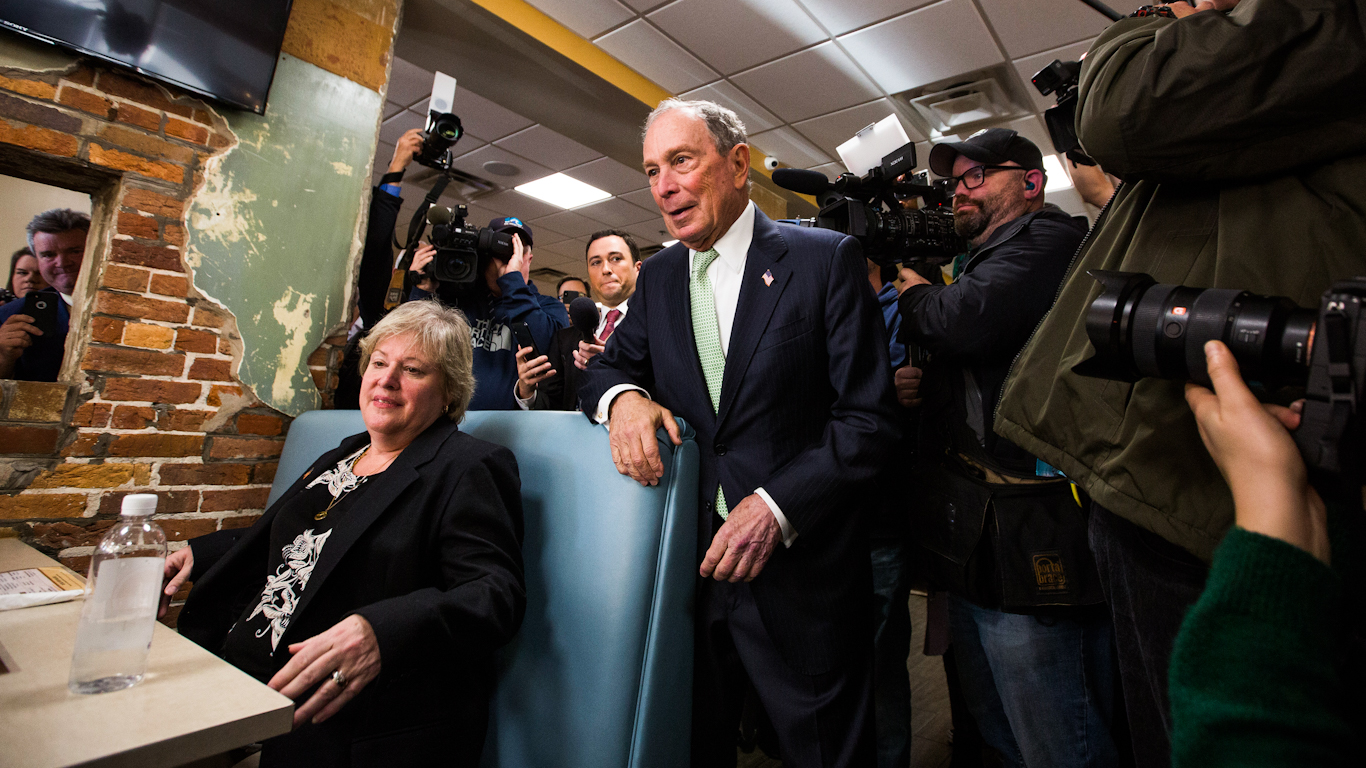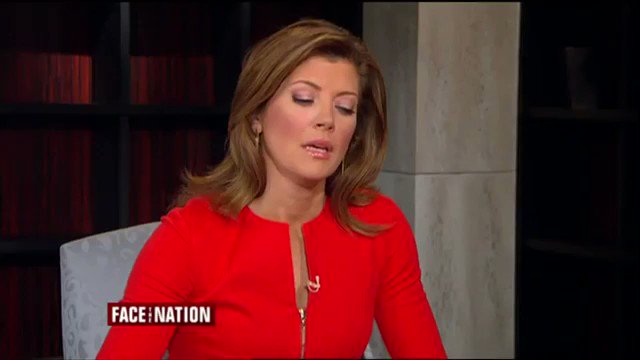Miljoenen
burgers in de VS kunnen hun stem niet uitbrengen of wordt het
onmogelijk gemaakt om te stemmen..... Je kan het wel vergeten mee te
doen aan deze verkiezingen als je niet een enorme zak geld meebrengt
en/of bedrijven en miljardairs achter je hebt staan.... In beide
gevallen zal er wat terug worden verwacht van het presidentschap,
ofwel de ene dienst is de andere waard (over 'quid pro quo' gesproken) en dat geldt zelfs voor
individuen die als Bloomberg schathemelrijk zijn, deze figuren zijn
zo rijk geworden omdat ze overal aan willen verdienen. Zie ook Trump
die met zijn presidentschap al weer vele miljoenen moet hebben
verdiend buiten het salaris voor het presidentschap om, daar hij dat presidentschap
ook ten dienste laat staan van zijn bedrijven, om over het aanstellen
van familieleden op hoge functies nog maar te zwijgen.....
Toch
heb ik het stuk van Macleod overgenomen, ten eerste daar men in de VS
de laatste jaren steeds meer vraagtekens zet bij het democratisch
gehalte van de staat en ten tweede daar zijn artikel een mooi inzicht
geeft in het reilen en zeilen van de verkiezingen in de VS, juist
gekoppeld aan het besteden van enorme sommen geld. Ten derde is
Bloomberg eigenaar van een flink aantal mediaorganen en juist die
combinatie is gevaarlijk voor de andere democratische deelnemers aan
de voorverkiezingen van het presidentschap.....
(Foto van Anti-Media overgenomen)
Bloombergs
mediaorganen met 2.700 journalisten kunnen hem al een deel van de
zege of zelfs de zege bezorgen...... Weer komt Macleod hier met een
vreemde vraag: of die journalisten dan wel eerlijk en objectief
zullen berichten en niet alleen in het voordeel van Bloomberg verslag
zullen doen van de aanloop naar de voorverkiezingen tot aan de
presidentsverkiezingen...... Macleod werkt voor een alternatief
mediaorgaan en zou moeten weten dat de reguliere massamedia al lang
niet meer onafhankelijk berichten, of zelfs onafhankelijk zijn, NB de
mediaorganen van Bloomberg laten dit al zien, zij zullen nooit
berichten brengen die ingaan tegen de belangen van Bloombergs enorme
aantallen aandelen* of zijn bedrijven, of zelfs tegen
zijn politieke ideologie (voor zover daar sprake van is, daar hij in
feite een Republikein is, maar nu opgaat voor de Democratische
Partij.....
Bloombergs gooi naar het presidentschap zal ingegeven zijn door Elisabeth Warrens en Bernie Sanders deelname aan de verkiezingen, daar Bloomberg, zoals vele rijke VS burgers, als de dood is voor
deze twee democraten, die beiden beloven de
welgestelden nu eindelijk eens aan te gaan pakken i.p.v. 'working Jane of Joe', of hun door politiek wanbeleid werkloos geworden collega's........ (al zijn de plannen zo dat de rijkdom van Bloomberg en anderen amper zal slinken......)
Zoals
gezegd het artikel komt van MintPress News, ik nam het over van
Anti-Media:
Michael Bloomberg’s Presidential Run Raises Serious Questions About Democracy

(foto van MintPress News overgenomen)
November
27, 2019 at 10:51 am
Written
by Alan
Macleod
(MPN Op-Ed) —
After months of speculation, former New York City Mayor Michael
Bloomberg formally announced a high-profile, big-money campaign to
become the Democratic Presidential nominee on November 24. The
77-year-old former Republican has decided that he is the perfect
candidate to prevent the president from achieving a second term.
Bloomberg
has a long history of support for conservative positions,
including endorsing George
W. Bush’s War on Terror and defending Israel’s 2014 assault on
Gaza.
In 2014, Michael Bloomberg went so violently right wing, that the White House's Valerie Jarrett had to stop him and say that Israel's bombing of 500 sleeping Palestinian children was inexcusable. He defended it.
More by @mehdirhasan at @theintercept here: theintercept.com/2019/11/25/mic…
More by @mehdirhasan at @theintercept here: theintercept.com/2019/11/25/mic…

The
primary reason why the self-described conservative has the ability to
credibly enter the race at such a late date is his financial clout.
Bloomberg is the world’s ninth richest individual, enjoying a net
worth of nearly
$55 billion and
he owns a huge eponymous media network, one of the largest in the
world.
His
recent entry into the ring has proven controversial with many who see
the plutocrat’s power and influence as an unfair advantage. Sawyer
Hackett, the National Press Secretary for his Democratic nomination
opponent Julian Castro noted that if someone had made half a million
dollars per day since the United States’ founding in 1776, they
would still be far poorer than Bloomberg himself is.
Hackett concluded,
“that kind of wealth shouldn’t be allowed to leverage success in
our primaries.”
Writer
and former New
York Times columnist
Anand Giridharadas pointed out that Bloomberg’s pitch to the
American people, that his wealth makes him incorruptible and
therefore more trustworthy, was illogical, given that the Democratic
Party is currently attempting
to impeach a
billionaire president on corruption charges, arguing that “being
very rich gives you more interests, not less.” It is for this
reason that Elizabeth Warren has accused
him of
trying to essentially “buy the nomination.”
“Someone who can’t be bought.”@MikeBloomberg is running on the idea of the ultra-rich being especially incorruptible — at the moment we are impeaching a rich president, who said he’d be incorruptible, for corruption. Turns out being very rich gives you more interests, not less. twitter.com/joeliklein/sta…
Yet
Bloomberg’s run for President highlights another danger: that of
freedom of the press. As the New
Republic warned,
the 2,700
journalists working
directly under him in his extensive media network are in an
impossible position. Can they truly report fairly and in an unbiased
manner on the presidential race when their owner has such an obvious
and important stake in its proceedings? If history is any judge, the
answer to that will be “no.” Silvio Berlusconi, for instance,
used his vast media empire to propel him and keep him in power as the
Prime Minister of Italy for nine years.
Bloomberg Editor
in Chief John Micklethwait announced a
series of top-down measures attempting to head off this problem,
instructing the company to simply not cover their boss or any of the
other candidates in the Democratic primaries. How a major news outlet
is going to ignore such an important ongoing process was not
explained.
Yet
the company appears to already be breaking this promise. The
organization ran three negative stories on
Elizabeth Warren in a 24-hour period earlier this week. Was this as a
response to her criticism of his actions or an attempt to undermine
one of the most popular rival candidates’ chances? That is a
question that arises uniquely in a situation where a politician owns
the means of communication.
Bloomberg
the billionaire has muddied the waters between his political
interests and his media empire even further by hiring David
Shipley and Tim O’Brien, Executive Editors from his news outlet, to
key positions in his presidential campaign.
Yet
another important danger to media freedom is the fact that Bloomberg
is promising to lavish enormous amounts of money to corporate media
outlets in the form of political advertising. Even before he had
officially announced his candidacy, he already
spent $33 million in
television advertising alone, beaming his message nationally and in
98 local markets. With the prospect of a bonanza of a seemingly
bottomless pile of advertising money, will corporate media outlets,
under intense financial pressure, be influenced in their coverage of
the billionaire’s activities?
There
is always a quid pro quo when one accepts funding from any powerful
person or organization.
The
billionaire already has a list of ringing media endorsements from
some of America’s most influential media figures. The New
York Times’ Thomas
Friedman claimed as
President he would “forcefully put a Democratic pro-growth,
pro-innovation, pro-business agenda on the table” in a column
entitled “Why I like Mike.” His colleague Bret Stephens cheered
him on. His article “Run,
Mike Run!” argued that the wonderful thing in choosing a
conservative Republican as Democratic candidate was that all the
usual Republican talking points about the Democrats being too liberal
would not work on Bloomberg. Meanwhile, one New
York Post commentator said he
was “delighted” that the plutocrat was “saving the party”
from out-of-touch socialists like Warren.

Can
we be sure that these are genuine expressions of support, or merely a
calculated quid pro quo? This is again a question that only arises in
a corporate, advertiser-dominated media ecosystem. Corporate media
have every reason to prop up the multi-billionaire’s campaign,
keeping him in the race as long as possible, knowing that the money
will continue to flow, as long as they do not portray him poorly.
(Rest assured that MintPress News has not been
approached to carry water for his campaign).
The
New Yorker’s presidential bid highlights the contradictions between
both extreme wealth and a for-profit, corporate advertiser-driven
media landscape and democracy and freedom of expression. Any
expansion of democracy and solution to these dilemmas requires
seriously questioning whether either of the first two are legitimate.
As Bernie Sanders said,
“Billionaires shouldn’t exist.”
=============================================
* Die aandelen vertegenwoordigen uiteraard ook belangen van Bloomberg, immers slechte pers over bedrijven waarin hij aandelen heeft, zullen die aandelen in waarde doen dalen.
Zie ook:
'Facebook keurde advertenties goed die waren gericht op neonazi's'
'VS presidentschap wordt gekocht met 100 dollar per uitgebrachte stem'
'Media en politiek bepalen waar wel en niet over gesproken wordt >> over manipulatie en desinformatie gesproken'
'Niet Rusland maar Trump beïnvloedt nu al de verkiezingen in Groot-Brittannië'
'Alexandria Ocasio-Cortez grilt Zuckerberg over misleidende advertenties op Facebook: liegen in verkiezingstijd is toegestaan'
'Tulsi Gabbard (Democratische presidentskandidaat) en de gestoken verkiezingen'
'Hillary Clinton manipuleert democratische voorverkiezingen'
'Ollongren (D66 minister) manipuleerde bevolking met beschuldiging Russische manipulatie door desinformatie en nepnieuws' (zie ook de links in dat bericht naar meer berichten over Ollongren en haar leugens)
'WaPo waarschuwt voor Russische digitale controle over de hersenen van VS burgers'
'Trump tracht met fake news het volk te manipuleren en daarmee de EU te schande te maken'
'ALEC is een extreem rechtse lobbyclub: corruptie tot op het hoogste niveau en (echte) beïnvloeding van verkiezingen'
''Geheime diensten in westen geven toe dat spioneren via het G5 netwerk praktisch onmogelijk is........'
'Federale rechter stelt ten overvloede dat DNC geen grond heeft voor zaak te tegen Trumps verkiezingsteam'
'Britse regering weigert RT en Sputnik voor conferentie over persvrijheid..... ha! ha! ha! ha! ha! ha! ha!'
'1984 het boek van George Orwell: niet langer fictie.......'
'Het westen vervolgt journalist Assange, Rusland laat journalist vrij na onrust over diens gevangenschap' (zie daarin ook de links naar andere berichten over Assange)
'De sterkste beïnvloeding van de VS presidentsverkiezingen wordt als volkomen 'legaal' en normaal gezien'
'Avaaz valt met fake news en desinformatie 'fake news en desinformatie' aan......' (zie in dat bericht ook de link naar een ander artikel met een smerige rol van Avaaz)
'Rob Jetten (D66 fractievoorzitter) liegt een fikse slag in de rondte in EU verkiezingspraatje'
'EU verkiezingen: manipulatie ook door lobbyisme is misdadig, zelfs Bas Eickhout (GroenLinks) doet hieraan mee'
'Intel processors al 10 jaar zo lek als een mandje, Intel niet een bedrijf uit Rusland of China, maar uit..... de VS!'
'Gelekte documenten tonen aan dat Google en Pinterest censuur uitoefenen'
'Facebook stelt klimaatsceptisch Daily Caller aan als 'factchecker...' ha! ha! ha! ha! ha!'
'Russiagate: nog overtuigd van bestaan daarvan? Lees dit!'
'Robert Mueller lijdt aan dementie en maakt van Russiagate een nog belachelijker verhaal'
'Putin vraagt en Trump levert: een lijst met 'alle goede zaken die Trump voor Rusland regelde''
* Die aandelen vertegenwoordigen uiteraard ook belangen van Bloomberg, immers slechte pers over bedrijven waarin hij aandelen heeft, zullen die aandelen in waarde doen dalen.
Zie ook:
'Facebook keurde advertenties goed die waren gericht op neonazi's'
'VS presidentschap wordt gekocht met 100 dollar per uitgebrachte stem'
'Media en politiek bepalen waar wel en niet over gesproken wordt >> over manipulatie en desinformatie gesproken'
'Niet Rusland maar Trump beïnvloedt nu al de verkiezingen in Groot-Brittannië'
'Alexandria Ocasio-Cortez grilt Zuckerberg over misleidende advertenties op Facebook: liegen in verkiezingstijd is toegestaan'
'Tulsi Gabbard (Democratische presidentskandidaat) en de gestoken verkiezingen'
'Hillary Clinton manipuleert democratische voorverkiezingen'
'Ollongren (D66 minister) manipuleerde bevolking met beschuldiging Russische manipulatie door desinformatie en nepnieuws' (zie ook de links in dat bericht naar meer berichten over Ollongren en haar leugens)
'WaPo waarschuwt voor Russische digitale controle over de hersenen van VS burgers'
'Trump tracht met fake news het volk te manipuleren en daarmee de EU te schande te maken'
'ALEC is een extreem rechtse lobbyclub: corruptie tot op het hoogste niveau en (echte) beïnvloeding van verkiezingen'
''Geheime diensten in westen geven toe dat spioneren via het G5 netwerk praktisch onmogelijk is........'
'Federale rechter stelt ten overvloede dat DNC geen grond heeft voor zaak te tegen Trumps verkiezingsteam'
'Britse regering weigert RT en Sputnik voor conferentie over persvrijheid..... ha! ha! ha! ha! ha! ha! ha!'
'1984 het boek van George Orwell: niet langer fictie.......'
'Het westen vervolgt journalist Assange, Rusland laat journalist vrij na onrust over diens gevangenschap' (zie daarin ook de links naar andere berichten over Assange)
'De sterkste beïnvloeding van de VS presidentsverkiezingen wordt als volkomen 'legaal' en normaal gezien'
'Avaaz valt met fake news en desinformatie 'fake news en desinformatie' aan......' (zie in dat bericht ook de link naar een ander artikel met een smerige rol van Avaaz)
'Rob Jetten (D66 fractievoorzitter) liegt een fikse slag in de rondte in EU verkiezingspraatje'
'EU verkiezingen: manipulatie ook door lobbyisme is misdadig, zelfs Bas Eickhout (GroenLinks) doet hieraan mee'
'Intel processors al 10 jaar zo lek als een mandje, Intel niet een bedrijf uit Rusland of China, maar uit..... de VS!'
'Gelekte documenten tonen aan dat Google en Pinterest censuur uitoefenen'
'Facebook stelt klimaatsceptisch Daily Caller aan als 'factchecker...' ha! ha! ha! ha! ha!'
'Russiagate: nog overtuigd van bestaan daarvan? Lees dit!'
'Robert Mueller lijdt aan dementie en maakt van Russiagate een nog belachelijker verhaal'
'Putin vraagt en Trump levert: een lijst met 'alle goede zaken die Trump voor Rusland regelde''



